Geothermal Systems Analysis
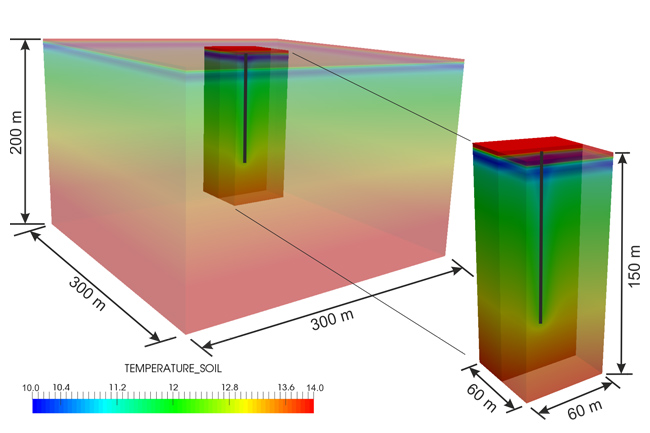
Along with the environmental awareness of the general public, geothermal has increasingly been considered an important renewable energy source. It is well known that the performance of a deep geothermal reservoir is determined by how much heat can be carried out by the circulating fluid in the reservoir. This flow rate is mostly dependent on the size of fracture apertures in the short term, while in the long term the fracture opening is more controlled by fluid-rock geochemical interactions. Also in shallow geothermal systems, the efficiency of Ground Source Heat Pump System (GSHPS) is strongly affected by the coupled fluid flow and heat transport process both inside and around borehole heat exchangers.
The working group "Geothermal Systems Analysis" conducts their research on the system understanding of both shallow and deep geothermal reservoirs. The research focuses on the quantification of coupled Thermal (T), Hydraulic (H), Mechanic (M) and Chemical (C) processes in the subsurface, which covers all underlying physics of geothermal reservoirs. This research focus is addressed by a strong team of numerical modelers, who work in close cooperation with geophysicists and field engineers. Based on the powerful numerical software OpenGeoSys, this team is capable of establishing, customizing, and calibrating numerical models for various types of geothermal reservoirs. With the accumulated knowledge, the aim of research is to provide suggestions to engineers.
- Implementation, validation, and verification of the dual-continuum based model for the simulation and optimization of Ground Source Heat Pump (GSHP) coupled Borehole Heat Exchangers (BHEs).
- Coupled T-H-M processes in fractured geothermal systems, with extended Finite Element Method (XFEM).
- Implementation of soil freezing model, coupling freezing process with deformation.
- Implementation of component based multiphase model into OGS. Application of the model to simulate thermally coupled multiphase flow processes in high-enthalpy deep geothermal reservoirs.
- Reactive transport modelling of mineral-water interactions in fractures, focusing on pressure solutions and coupled mechanical effects.
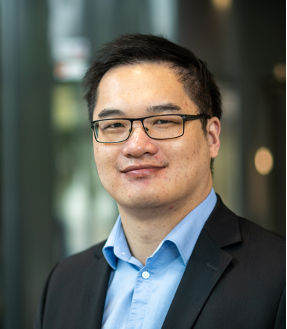 Dr. Haibing Shao
Dr. Haibing Shao
Staff Scientist / Workgroup Leader
Dr. Haibing Shao is staff scientist by UFZ and leading the work group Geothermal System Analysis. He got his Bachelor degree in 2005 from Tongji University in Shanghai, China. Supported by the IPSWat scholarship from German Ministry of Education and Research (BMBF), he continued his study in Germany and obtained his Master and PhD degree at Uni Tübingen (2007) and TU Dresden (2010) respectively. After graduation, he worked as a visiting researcher at the Lawrence Berkeley National Laboratory (LBNL) in the U.S. Thereafter, he started his career at the Helmholtz Centre for Environmental Research (UFZ). His research focuses on the numerical modeling of coupled physical processes in fractured and porous media.
See staff webpage for further information.
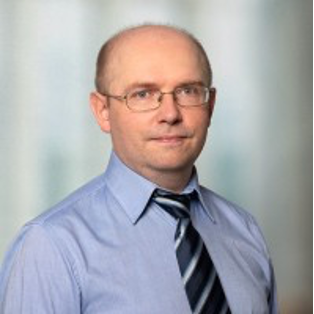 Dr. Tymofiy Gerasimov
Dr. Tymofiy Gerasimov
PostDoc
Tymofiy Gerasimov got his PhD in pure and applied mathematics from TU Delft and since then has been working on mathematical and computational aspects of Solid Mechanics with the aim of developing faster, simpler, more accurate numerical models and algorithms. He has multiple scientific contributions in computational fracture mechanics, adaptive finite element method (including error-estimation analysis) and phase-field modeling of fracture (brittle, ductile, anisotropic formulations in deterministic and stochastic settings). He joined the UFZ department of environmental informatics in May 2022 as a code developer. His main task is extending the classical Thermal-Hydro-Mechanical model in the OpenGeoSys software platform to simulate freezing of a saturated soil. Among applications are shallow subsurface ice storage, buildings cooling, evaluation of environmental impact of soil freezing and thawing cycles etc.
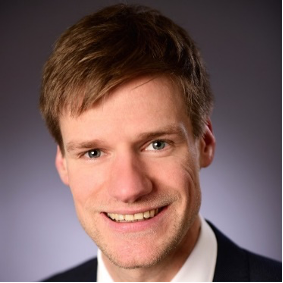 Dr. Falko Vehling
Dr. Falko Vehling
PostDoc
Dr. Falko Vehling has received his doctoral degree from Kiel University, where he has studied geophysics before. His doctoral research comprises numerical modeling of multiphase transport phenomena in porous media with applications to mid-ocean ridge hydrothermal systems. Currently he is working within the EURAD project. Here he focuses on reactive transport processes in waste repositories. In his research work, he favors to develop numerical models for multiphase flow coupled with reactive transport process in the subsurface. Application areas of interest are waste repositories, geothermal reservoirs, magmatic hydrothermal systems and ore-forming systems.
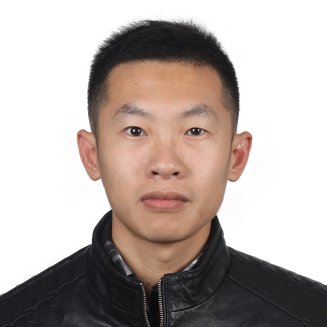 Dr. Chaofan Chen
Dr. Chaofan Chen
PostDoc
Dr. Chaofan Chen is a postdoctoral researcher in the department of Environmental Informatics at the UFZ funded by the “Helmholtz-OCPC Postdoc-Fellowship”. He got his bachelor and master degree from China University of Mining and Technology - Beijing, and then received his PhD degree from Dresden University of Technology in Germany in 2022. His research interest is the integrated simulation of subsurface geothermal reservoir with surface thermodynamic process for energy applications, such as geothermal power plant and ground source heat pump.
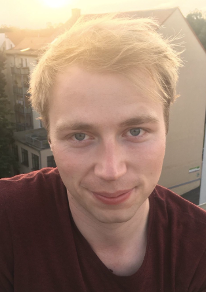 Maximilliam Dörnbrack
Maximilliam Dörnbrack
PhD Student / TU Freiberg
Maximilian Dörnbrack joined the Department of Environmental Informatics as a PhD student in 2022, funded by the SpeicherCity project. He studied geology at the TU Freiberg and completed his master's degree in 2022, with specialisation in hydrogeology and engineering geology. He is working on the simulation of aquifer thermal energy storage (ATES) of contaminated groundwater in combination with remediation techniques. His research is to extend the application of OGS-6 for THC modelling.
Alumni
- Jakob Randow, ResearchGate
- Boyan Meng, ResearchGate
- Dr. Renchao Lu, LinkedIn
- Dr. Wanlong Cai, ResearchGate
- Dr. Yonghui Huang, ResearchGate
- Dr. Tianyuan Zhen, ResearchGate
- Dr. Philipp Hein, LinkedIn
- Dr. Norihiro Watanabe, ResearchGate
